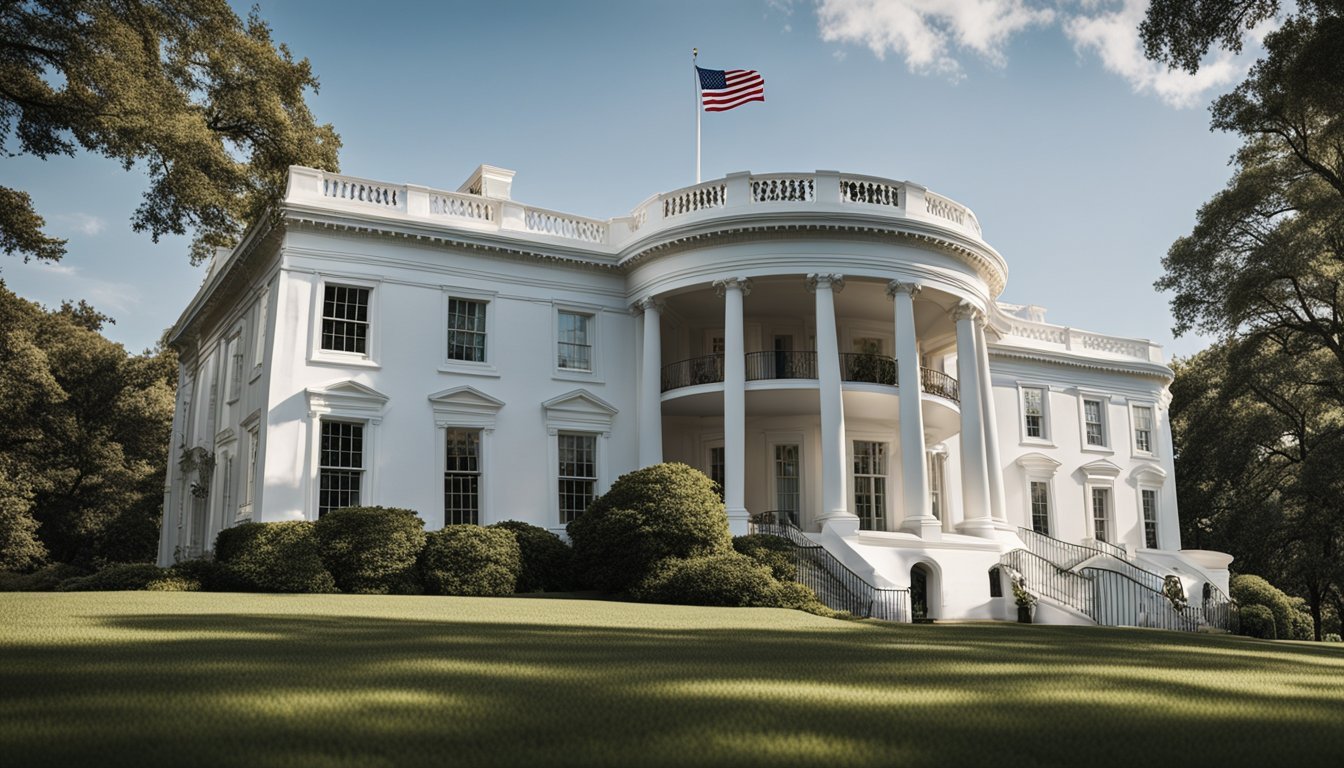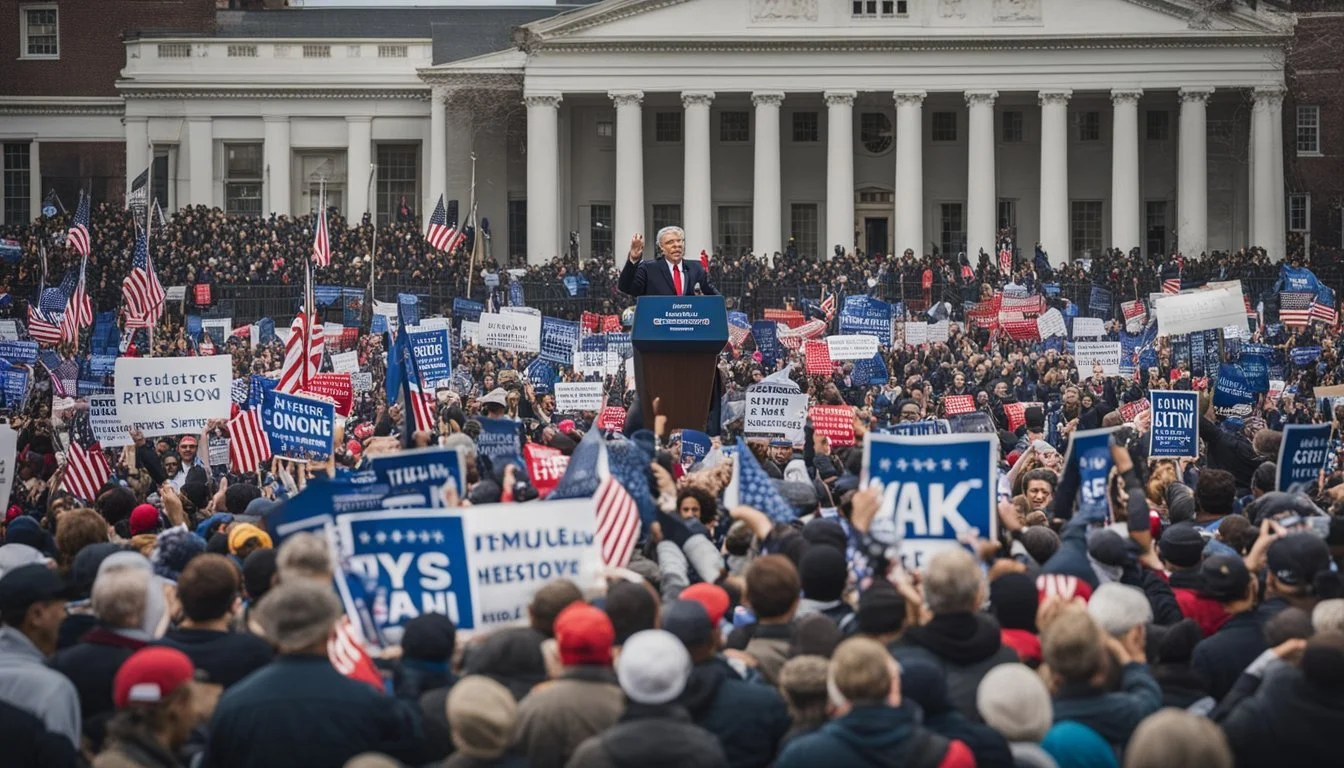5 Enlightening Films on Andrew Johnson's Tumultuous Presidency
A Visual Journey Through Post-Civil War Leadership
Andrew Johnson's presidency stands as one of the most turbulent periods in American history. Following Abraham Lincoln's assassination, Johnson faced the monumental task of leading a nation still reeling from the Civil War. His time in office was marked by political battles, controversial decisions, and ultimately, impeachment.
Several films have sought to capture the complexity of Johnson's presidency, offering viewers a glimpse into this pivotal era. These cinematic works explore Johnson's rise from humble beginnings to the highest office in the land, his struggles with Reconstruction policies, and the intense conflicts that defined his administration. Through a combination of historical accuracy and dramatic storytelling, these films provide valuable insights into a critical chapter of American history.
1) Lincoln and Johnson: An Unlikely Alliance
Abraham Lincoln and Andrew Johnson formed an unexpected political partnership during a critical time in American history. Their alliance began in 1864 when Lincoln chose Johnson as his running mate for his reelection campaign.
Johnson, a Democrat from Tennessee, was the only Southern senator who remained loyal to the Union during the Civil War. This made him an attractive choice for Lincoln's National Union ticket, which aimed to unite the country.
Despite their different backgrounds and political affiliations, Lincoln and Johnson shared a commitment to preserving the Union. Their partnership was seen as a symbol of national unity during a time of deep division.
However, their alliance was short-lived. Lincoln's assassination in April 1865 thrust Johnson into the presidency, where he faced the enormous challenge of leading the nation through Reconstruction.
Johnson's approach to Reconstruction often diverged from Lincoln's vision, leading to conflicts with Congress and ultimately his impeachment in 1868. The story of their unlikely alliance and its aftermath continues to fascinate historians and filmmakers alike.
Learn more about Lincoln and Johnson's alliance
2) The Impeachment: A Constitutional Crisis
Andrew Johnson's impeachment in 1868 marked a pivotal moment in American history. The House of Representatives voted to impeach Johnson, making him the first U.S. president to face this process.
Johnson's conflict with Congress stemmed from disagreements over Reconstruction policies following the Civil War. The Radical Republicans, who controlled Congress, sought to impose stricter measures on the defeated South.
The immediate trigger for impeachment was Johnson's violation of the Tenure of Office Act. This law, passed by Congress in 1867, restricted the president's ability to remove certain officeholders without Senate approval.
When Johnson dismissed Secretary of War Edwin Stanton, it set the stage for a constitutional showdown. The House swiftly voted to impeach Johnson on February 24, 1868.
The Senate trial that followed was a tense affair, with the nation's political future hanging in the balance. Johnson narrowly escaped conviction by a single vote, preserving his presidency but leaving his authority diminished.
This episode highlighted the delicate balance of power between the executive and legislative branches. It raised questions about the limits of presidential authority and the appropriate use of impeachment as a political tool.
3) Johnson's Reconstruction Policies
Andrew Johnson's approach to Reconstruction focused on leniency towards the South. He favored quick readmission of former Confederate states to the Union with minimal conditions.
Johnson issued pardons to many former Confederates and allowed Southern states to elect new governments. These governments often included ex-Confederate officials and enacted discriminatory "Black Codes" restricting freedmen's rights.
His policies clashed with the Republican-controlled Congress, which sought stronger protections for freed slaves and harsher treatment of Confederate leaders. This conflict led to increasing tensions between Johnson and Congress.
The president vetoed key Reconstruction legislation like the Freedmen's Bureau Bill and Civil Rights Act of 1866. Congress overrode his vetoes and passed constitutional amendments over his objections.
Johnson's lenient policies and opposition to Congressional Reconstruction plans ultimately contributed to his impeachment in 1868. Though acquitted, his influence on Reconstruction was severely diminished in his final years as president.
4) The Radical Republicans vs. Andrew Johnson
The conflict between President Andrew Johnson and the Radical Republicans shaped the course of Reconstruction after the Civil War. Johnson favored a lenient approach to reintegrating Southern states, while Radical Republicans pushed for stronger protections for freed slaves.
Johnson's plan allowed former Confederate states to rejoin the Union with few conditions. This angered Radical Republicans who saw it as too soft on the South. They passed civil rights legislation and constitutional amendments over Johnson's vetoes.
The struggle culminated in Johnson's impeachment in 1868. He was charged with violating the Tenure of Office Act by removing Secretary of War Edwin Stanton. Johnson narrowly avoided conviction and removal from office by one Senate vote.
This pivotal period saw a constitutional crisis as the executive and legislative branches battled over the direction of Reconstruction. The Radical Republicans ultimately prevailed in implementing a more stringent Reconstruction policy in the South.
5) Legacy of a Controversial Leader
Andrew Johnson's presidency left an indelible mark on American history. His time in office was characterized by intense political conflict and a struggle for power with Congress.
Johnson's impeachment in 1868 remains a pivotal moment in U.S. political history. It highlighted the deep divisions within the country following the Civil War and set important precedents for executive-legislative relations.
The film "Impeached! The Rise and Fall of Andrew Johnson" (2018) explores these themes in depth. It examines Johnson's background as a tailor from Tennessee and his unexpected ascent to the presidency following Lincoln's assassination.
Johnson's approach to Reconstruction and his vetoes of civil rights legislation shaped race relations for decades to come. His actions had long-lasting consequences for the integration of former slaves into American society.
"Going to the Devil: The Impeachment of 1868" (2019) provides insight into the impeachment process and its impact on Johnson's legacy. The film delves into the political maneuvering and constitutional issues surrounding this historic event.
More information on "Going to the Devil: The Impeachment of 1868"
Historical Context of Andrew Johnson's Presidency
Andrew Johnson's presidency occurred during a pivotal time in American history, marked by the aftermath of the Civil War and the challenges of reuniting a fractured nation.
Johnson's Rise to Power
Andrew Johnson became president unexpectedly on April 15, 1865, following Abraham Lincoln's assassination. A Democrat from Tennessee, Johnson had been chosen as Lincoln's running mate in 1864 to appeal to Southerners loyal to the Union.
Johnson's political career began in local Tennessee politics. He served as a U.S. Representative, governor of Tennessee, and U.S. Senator before becoming vice president.
His stance against Southern secession made him unique among Southern Democrats, leading to his selection as Lincoln's vice president on the National Union ticket.
The Post-Civil War Era
Johnson assumed the presidency at a crucial juncture, with the Civil War just ending and the nation facing the monumental task of reunification. The period known as Reconstruction presented significant challenges.
Key issues included:
Reintegrating former Confederate states
Determining the status of freed slaves
Rebuilding the war-torn South
Johnson favored a lenient approach to the South, clashing with the Radical Republicans in Congress who sought stricter policies and greater protections for former slaves.
This political conflict shaped much of Johnson's presidency and led to intense debates over the direction of Reconstruction policies.
Key Challenges of Johnson's Administration
Andrew Johnson faced significant obstacles during his presidency. His approach to Reconstruction and contentious relationship with Congress shaped the tumultuous post-Civil War era.
Reconstruction Policies
Johnson favored a lenient approach towards the Southern states. He issued pardons to former Confederates and allowed Southern state governments to quickly reorganize. This policy angered Radical Republicans in Congress who sought stricter measures.
Johnson vetoed the Freedmen's Bureau Bill and the Civil Rights Act of 1866. These actions further strained relations with lawmakers and raised concerns about the rights of newly freed slaves.
The president's Reconstruction plan did not include voting rights for African Americans. This omission conflicted with Congressional Republicans' vision for the South's reintegration into the Union.
Conflicts with Congress
Johnson's battles with Congress intensified as his presidency progressed. The Radical Republicans passed the Reconstruction Acts of 1867 over Johnson's veto, dividing the South into military districts.
The Tenure of Office Act restricted the president's power to remove certain officeholders. Johnson's dismissal of Secretary of War Edwin Stanton in violation of this act led to his impeachment in 1868.
The House of Representatives voted to impeach Johnson on February 24, 1868. He narrowly avoided conviction in the Senate by one vote, but his political influence was severely diminished.
Johnson's clashes with Congress hampered the implementation of coherent Reconstruction policies. This power struggle left a lasting impact on the post-war United States.
Impact of Johnson's Presidency on Modern Politics
Andrew Johnson's presidency left a lasting impact on American politics. His clashes with Congress over Reconstruction policies set important precedents for executive-legislative relations.
Johnson's impeachment trial established key legal and constitutional principles. It clarified the scope of impeachable offenses and reinforced limits on presidential power.
The 14th Amendment, passed over Johnson's veto, remains crucial in civil rights law today. It granted citizenship to former slaves and guaranteed equal protection under the law.
Johnson's lenient approach to the defeated South influenced regional politics for decades. It contributed to the rise of Jim Crow laws and delayed full civil rights for African Americans.
His presidency highlighted the importance of vice presidential selection. Johnson's unexpected ascension to power demonstrated the need for capable vice presidents.
The Tenure of Office Act, passed to limit Johnson's power, affected presidential authority until its repeal in 1887. It sparked debates about separation of powers that continue today.
Johnson's struggles with Congress led to reforms in the impeachment process. These changes aimed to make the procedure more impartial and less politically motivated.




